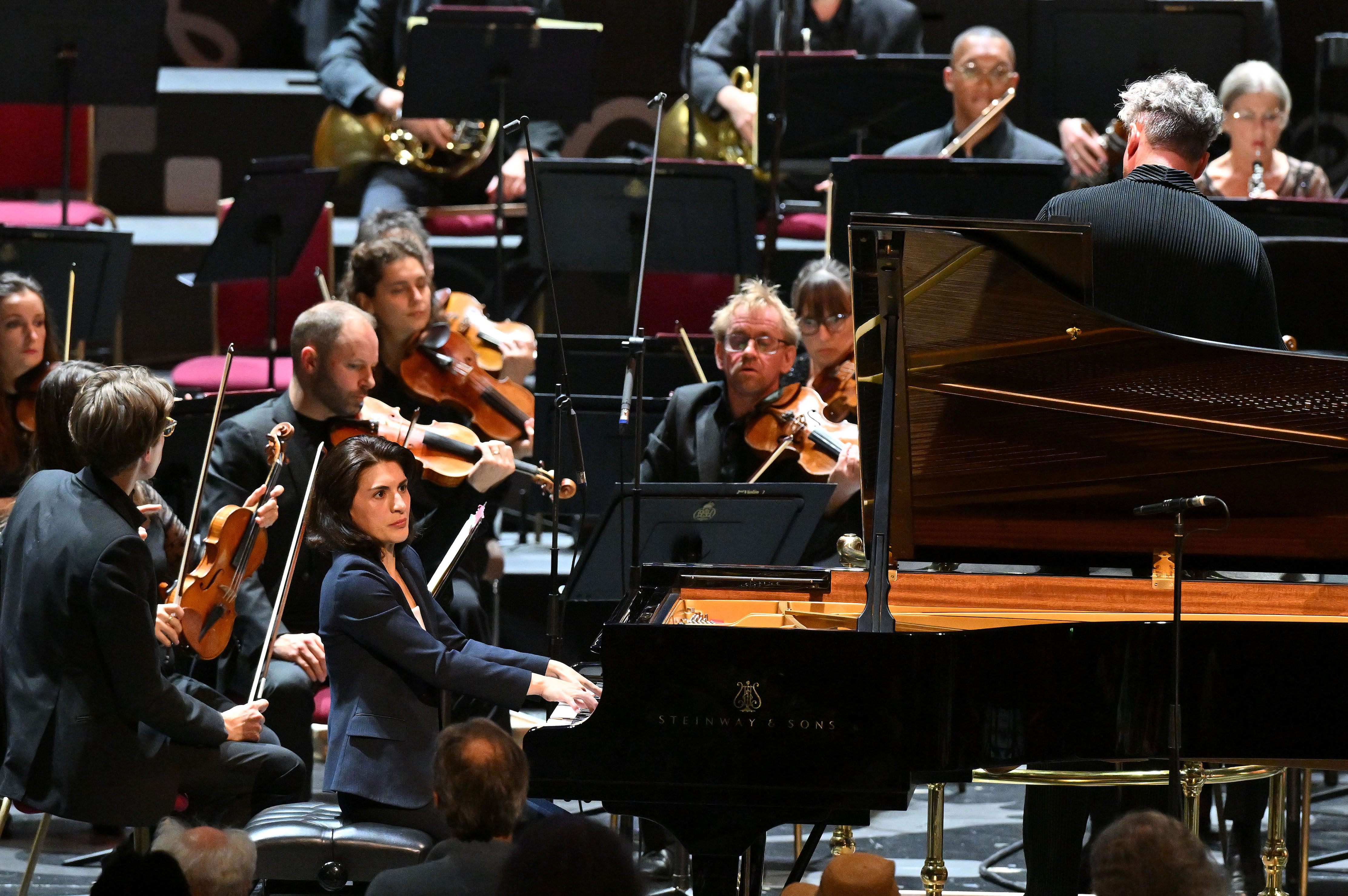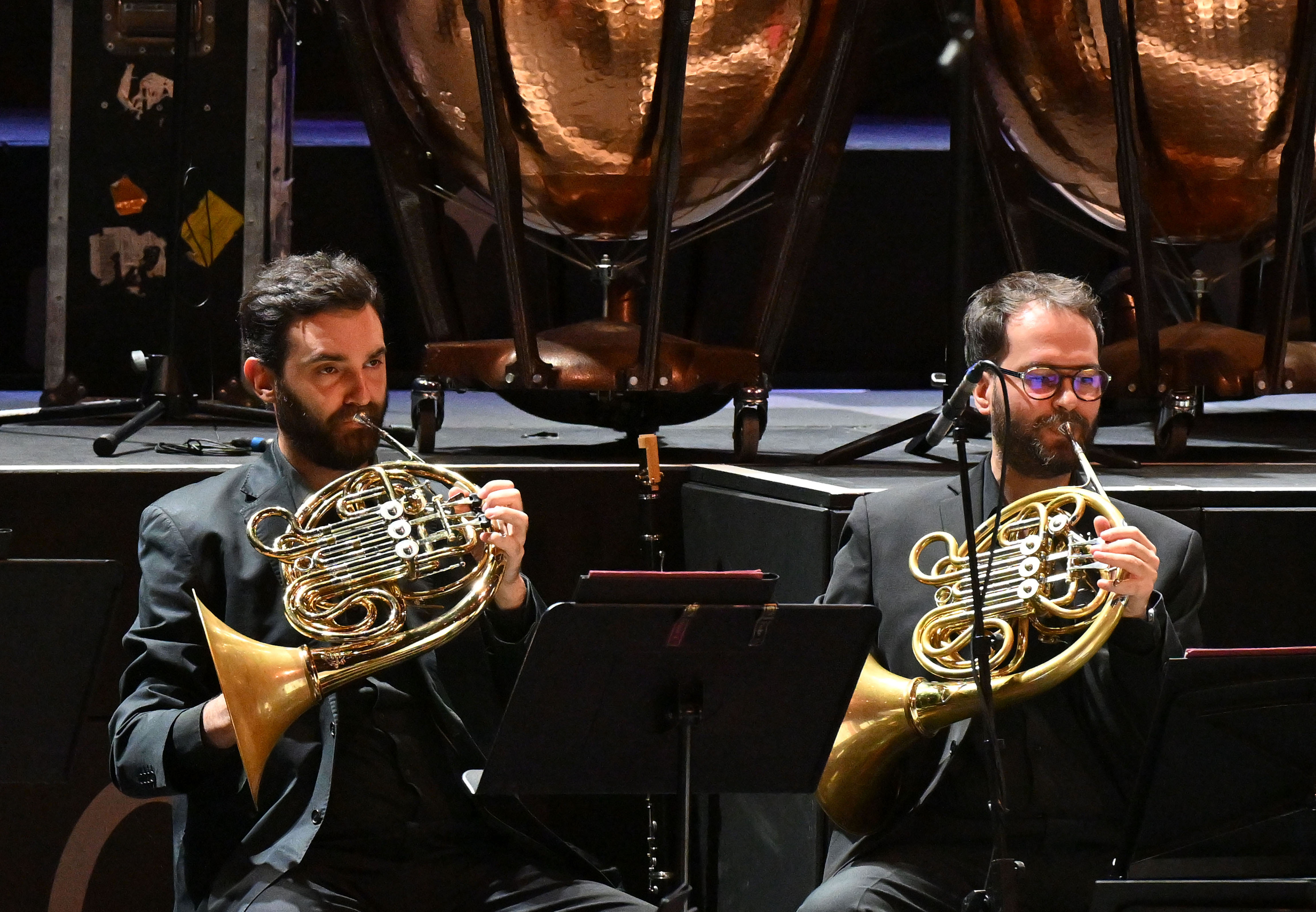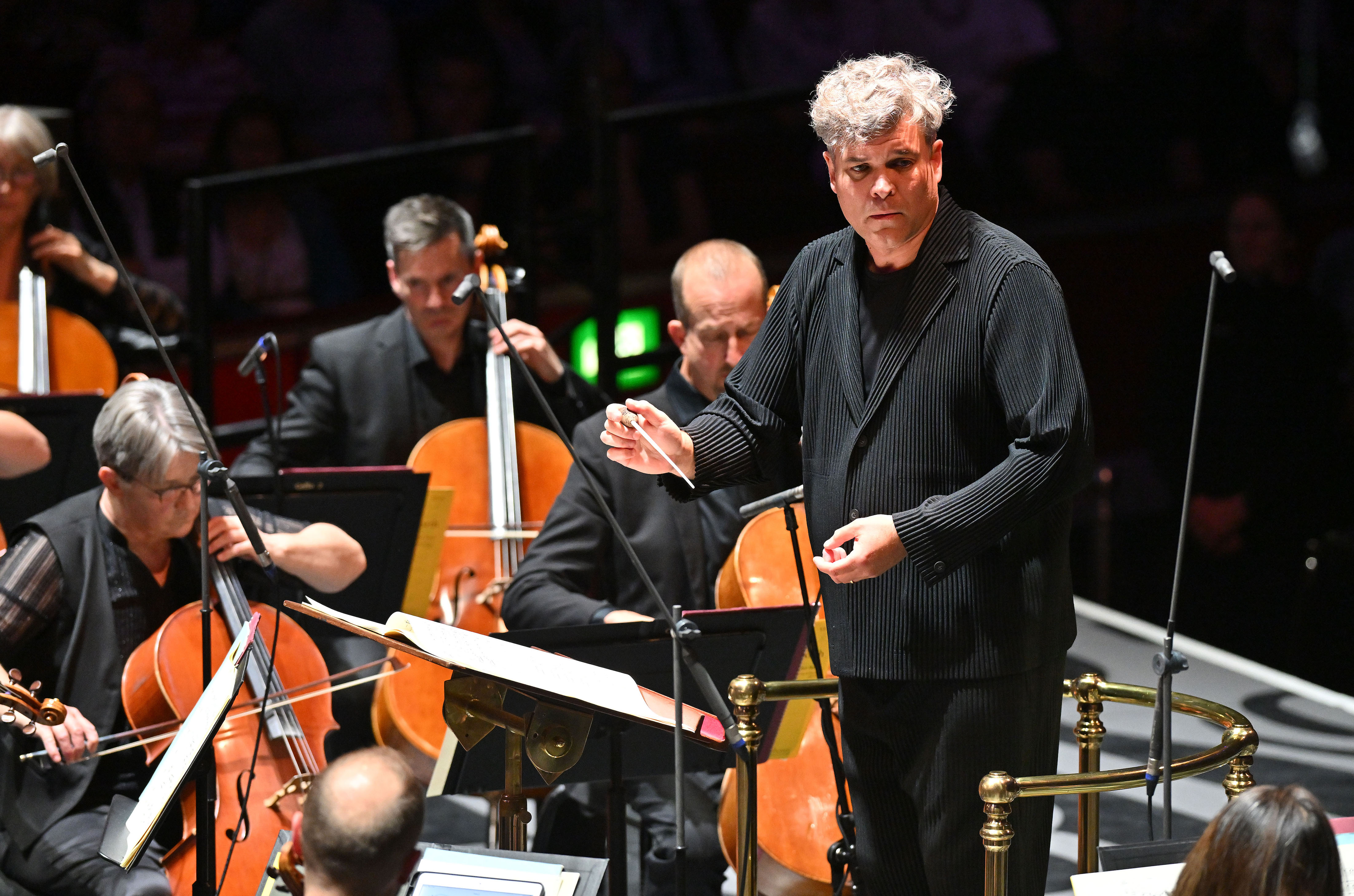BBC Proms: Batsashvili, BBC Scottish Symphony Orchestra, Ryan Wigglesworth review - grief and glory | reviews, news & interviews
BBC Proms: Batsashvili, BBC Scottish Symphony Orchestra, Ryan Wigglesworth review - grief and glory
BBC Proms: Batsashvili, BBC Scottish Symphony Orchestra, Ryan Wigglesworth review - grief and glory
Subdued Mozart yields to blazing Bruckner

This Prom began in sombre and melancholic shades of grey. Then, as her encore, the superb Georgian pianist Mariam Batsashvili launched into Liszt’s Paganini étude, “La Campanella”, and bells of long-awaited joy rang around the Royal Albert Hall. Under those leaping acrobatic fingers, musical sunshine drove away the clouds.
Planned or not, these drastic contrasts prepared the ground for the volatile monster to come: Bruckner’s Seventh Symphony, with its huge lurches and topples from darkness to light, and back again.
Ryan Wigglesworth conducted the BBC Scottish Symphony Orchestra. He began with his own composition: an elegy for the BBCSSO’s former leader Laura Samuel who died, at 48, last year. Scored for string orchestra, “for Laura, after Bach” takes its cue from the Gigue in Bach’s E major Partita. Wigglesworth gathers fragments of the core material into layered canons and variations, with solo bass, brooding cellos and divided violins building dark-hued textures lit by flashes of melodic fire. Despite its Baroque provenance, the tense, bittersweet harmonies of fin-de-siècle Vienna – the sound-world of late Mahler and early Berg or Schönberg – also seemed to colour the densely-woven fabric of the piece. This ambience of tender mourning cast its shadow over Wigglesworth’s approach to Mozart’s D minor piano concerto, no. 20, with Batsashvili as soloist. Yes, Mozart paints here with an unusually subdued palette. But it sometimes felt as if Wigglesworth were, via his tempi and dynamics, seeking to deepen these patches of gloom. Limpid, elegant, always poised, Batsashvili’s playing blended into this reflective, even introspective mood.
This ambience of tender mourning cast its shadow over Wigglesworth’s approach to Mozart’s D minor piano concerto, no. 20, with Batsashvili as soloist. Yes, Mozart paints here with an unusually subdued palette. But it sometimes felt as if Wigglesworth were, via his tempi and dynamics, seeking to deepen these patches of gloom. Limpid, elegant, always poised, Batsashvili’s playing blended into this reflective, even introspective mood.
The BBCSSO, trim and tight in their Mozart-era numbers, contributed some fine woodwind and string accents but sounded, if anything, over-restrained. Still, Batsashvili (pictured above) lent the gorgeous Romance all the questing charm that its unchained melody demands, and made the cadenzas – she chose Beethoven’s – strikingly dramatic. In the closing rondo, the pair of horns (pictured below) suddenly sounded bold and impudent, as if let off the leash. Maybe their minds were on the Brucknerian brass heroics still to come. Before that, however, Batsashvili triumphantly turned to Liszt/Paganini, and let the sun blaze in. Bruckner’s Seventh (in E major, like the Partita that inspired Wigglesworth) furnished a tremendous Proms showcase for the BBCSSO at full strength and beyond – amplified notably by the quartet of Wagner tubas that thrillingly enhance the aural landscape from the second movement onwards. Overall, the orchestra rose splendidly to this monumental challenge, although Wigglesworth (like many conductors) didn’t always make the pattern of the first movement clear, as its endless, even baffling, surges and ebbs of sound flow from the initial horn-and-cello theme. Still, individual sections in this stop-start epic commanded the hall: not just the dominant brass – from all-important contrabass tuba (Andrew Duncan) right up to radiant solo trumpet passages (Mark O’Keeffe) – but the ripe and lush strings (led by Roberto Ruisi).
Bruckner’s Seventh (in E major, like the Partita that inspired Wigglesworth) furnished a tremendous Proms showcase for the BBCSSO at full strength and beyond – amplified notably by the quartet of Wagner tubas that thrillingly enhance the aural landscape from the second movement onwards. Overall, the orchestra rose splendidly to this monumental challenge, although Wigglesworth (like many conductors) didn’t always make the pattern of the first movement clear, as its endless, even baffling, surges and ebbs of sound flow from the initial horn-and-cello theme. Still, individual sections in this stop-start epic commanded the hall: not just the dominant brass – from all-important contrabass tuba (Andrew Duncan) right up to radiant solo trumpet passages (Mark O’Keeffe) – but the ripe and lush strings (led by Roberto Ruisi).
The middle movements, as they should, stirred the soul and quickened the blood. In the Adagio, Bruckner’s lament for his model and mentor Wagner, the keening strings displayed real grit and bite to balance the earth-moving sonorities of the brass, with those Wagner tubas proclaiming an irresistible doom. Wigglesworth let us hear the traces of an elegant classicism here as well, with subtle woodwind touches and – above all – wistful solo excursions on Matthew Higham’s flute. He drove the great relentless fanfares of the scherzo as hard and fiercely as they need, but gave the strings space to soften and relax – and the woods more chances to shine – amid the spun-silk sweetness of the trio.  As for the finale, conductor and orchestra found a momentum and cohesion that saved the pummelling iterations of its central motif from tedium. You can’t avoid the element of heavy-booted stomp here, but you can make those peasant hobnails fly and dance. By and large, Wigglesworth’s crew did. The cumulative power of those massive brass chorales could have raised the dead. And Gordon Rigby's timpani, so sparingly but tellingly deployed, grandly rolled and thundered. As always, the Proms invites UK orchestra from beyond the metropolis to descend on Kensington, make a splash, and raise the roof. After a rather cramped and veiled start, the BBCSSO left us with a truly mighty, and a joyful, noise.
As for the finale, conductor and orchestra found a momentum and cohesion that saved the pummelling iterations of its central motif from tedium. You can’t avoid the element of heavy-booted stomp here, but you can make those peasant hobnails fly and dance. By and large, Wigglesworth’s crew did. The cumulative power of those massive brass chorales could have raised the dead. And Gordon Rigby's timpani, so sparingly but tellingly deployed, grandly rolled and thundered. As always, the Proms invites UK orchestra from beyond the metropolis to descend on Kensington, make a splash, and raise the roof. After a rather cramped and veiled start, the BBCSSO left us with a truly mighty, and a joyful, noise.
rating
Share this article
The future of Arts Journalism
You can stop theartsdesk.com closing!
We urgently need financing to survive. Our fundraising drive has thus far raised £49,000 but we need to reach £100,000 or we will be forced to close. Please contribute here: https://gofund.me/c3f6033d
And if you can forward this information to anyone who might assist, we’d be grateful.

Subscribe to theartsdesk.com
Thank you for continuing to read our work on theartsdesk.com. For unlimited access to every article in its entirety, including our archive of more than 15,000 pieces, we're asking for £5 per month or £40 per year. We feel it's a very good deal, and hope you do too.
To take a subscription now simply click here.
And if you're looking for that extra gift for a friend or family member, why not treat them to a theartsdesk.com gift subscription?
more Classical music
 BBC Proms: Batsashvili, BBC Scottish Symphony Orchestra, Ryan Wigglesworth review - grief and glory
Subdued Mozart yields to blazing Bruckner
BBC Proms: Batsashvili, BBC Scottish Symphony Orchestra, Ryan Wigglesworth review - grief and glory
Subdued Mozart yields to blazing Bruckner
 Classical CDs: Hens, Hamburg and handmaids
An unsung French conductor boxed up, plus Argentinian string quartets and baroque keyboard music
Classical CDs: Hens, Hamburg and handmaids
An unsung French conductor boxed up, plus Argentinian string quartets and baroque keyboard music
 BBC Proms: McCarthy, Bournemouth SO, Wigglesworth review - spring-heeled variety
A Ravel concerto and a Walton symphony with depth but huge entertainment value
BBC Proms: McCarthy, Bournemouth SO, Wigglesworth review - spring-heeled variety
A Ravel concerto and a Walton symphony with depth but huge entertainment value
 BBC Proms: First Night, Batiashvili, BBCSO, Oramo review - glorious Vaughan Williams
Spirited festival opener is crowned with little-heard choral epic
BBC Proms: First Night, Batiashvili, BBCSO, Oramo review - glorious Vaughan Williams
Spirited festival opener is crowned with little-heard choral epic
 Interview: Quinteto Astor Piazzolla on playing in London and why Mick Jagger's a fan
Music Director Julián Vat and pianist Matias Feigin compare notes on Piazzolla
Interview: Quinteto Astor Piazzolla on playing in London and why Mick Jagger's a fan
Music Director Julián Vat and pianist Matias Feigin compare notes on Piazzolla
 Classical CDs: Bells, birdsong and braggadocio
British contemporary music, percussive piano concertos and a talented baritone sings Mozart
Classical CDs: Bells, birdsong and braggadocio
British contemporary music, percussive piano concertos and a talented baritone sings Mozart
 Siglo de Oro, Wigmore Hall review - electronic Lamentations and Trojan tragedy
Committed and intense performance of a newly-commissioned oratorio
Siglo de Oro, Wigmore Hall review - electronic Lamentations and Trojan tragedy
Committed and intense performance of a newly-commissioned oratorio
 Alfred Brendel 1931-2025 - a personal tribute
A master of feeling and intellect
Alfred Brendel 1931-2025 - a personal tribute
A master of feeling and intellect
 Aldeburgh Festival, Weekend 2 review - nine premieres, three young ensembles - and Allan Clayton
A solstice sunrise swim crowned the best of times at this phoenix of a festival
Aldeburgh Festival, Weekend 2 review - nine premieres, three young ensembles - and Allan Clayton
A solstice sunrise swim crowned the best of times at this phoenix of a festival

Add comment